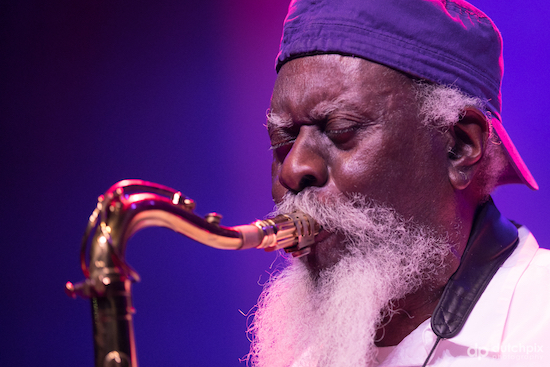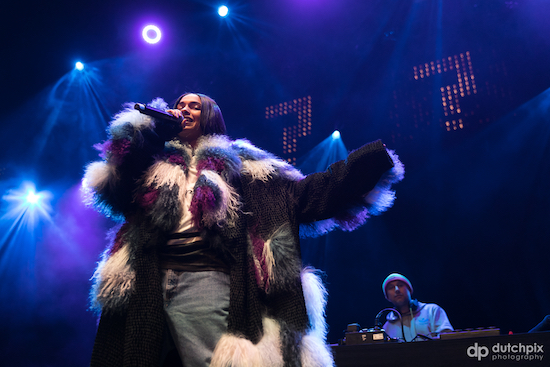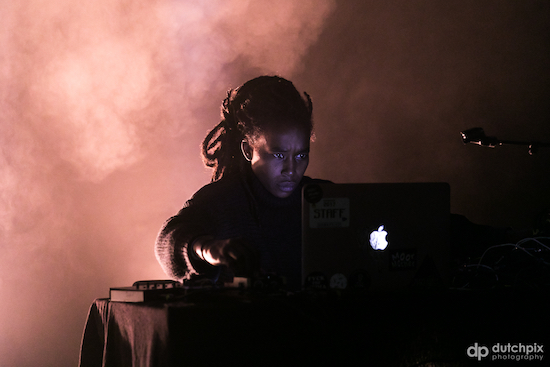Moor Mother. All photos by Jan Rijk at Dutchpix
The notion of eclecticism has become tainted by misuse, but Le Guess Who? gets it right. There are more than 100 shows across theatres, clubs, churches, galleries and pop-up venues during the four-day festival, overseen by the festival organisers and this year’s guest curators: Perfume Genius, Jerusalem In My Heart, James Holden, Grouper, Basilica Soundscape, Shabazz Palaces, and Han Bennink. Each curator leans towards certain genres, but none seeks to define a particular style or scene; they just share their passions and make interesting connections.
The Dutch festival doesn’t make a big deal of its diversity – it just gets on with it. The programming goes deep enough to avoid any accusations of tokenism, and there’s no sense of ownership or saviour-dom over non-western acts. At its best, the festival could be seen as a post-everything utopia, where it’s perfectly normal for Lebanese classical singers and Kiwi drone guitarists to share bills with Texan grime producers and Bulgarian choirs. In an era of populist nationalism and Fortress Europe, we need events like LGW? to remind us that a better world is possible. That’s not to say the festival is some kind of fluffy idyll, cut off from political reality. The programming by Jerusalem In My Heart’s Radwan Ghazi Moumneh is a radical celebration of Arab culture that seeks to overturn racist and colonial tropes.
Le Guess Who? is a great example of how music scenes on both sides of the Atlantic have been revitalised by internet-enabled internationalism on one hand, and local grassroots organising on the other. One could even argue that the festival makes manifest of a radical community of artists, conversing across space, time and genre. But let’s not get too carried away. As a white cishet man, it’s not my place to say how successfully the festival practices inclusivity, but if we’re going to talk about utopian music communities then we all have to consider who is included and excluded, not only in terms of the performers, but the audience. The cost of the festival inevitably excludes some, but public funding does at least help keep prices reasonable. The audience is predominantly white, but the organisers have made efforts to reach out to local diasporic communities, not least through a partnership with the multicultural Lombok district’s own festival. To their credit, the festival organisers appear to be taking practical steps towards their utopian ideal.
And so to the music. As tQ’s resident jazz buff, I was naturally looking forward to catching the strand curated by percussionist Han Bennink. The legendary Dutch percussionist appears to be on a mission to play with everyone. I miss his opening set with Keiji Haino, which apparently features the Japanese legend throwing a basketball at an acoustic guitar that’s suspended from the ceiling. But I do arrive in time for his set with Thurston Moore, all gnarled guitar sproing and cleanly executed drum hits. Moore is perhaps over reliant on behind-the-neck chimes and tremolo arms wobble, but he has a nice line in atmospheric feedback tones, animated by Bennink’s spacious tom patterns and foot-on-snare modulations. The following evening’s reunion with the great German pianist Alexander Von Schlippenbach avoids the weight of expectation by being a warm, jazzy affair. They helped invent European free improvisation, and now these two have nothing to prove; their set has a lovely sense of two musicians at ease with themselves. For his solo encore, Bennink plays the floor, rapping his sticks off Theater Kikker’s polished wooden boards. In lesser hands, such antics could be merely wacky, but there’s a cracked intensity to Bennink’s clowning; all of life, including its absurdities, is here.
On Saturday Bennink plays an-all-too brief set with his old sparring partner Peter Brötzmann. There are flashes of brilliance, but 20 minutes isn’t long enough for this peerless reeds and percussion duo to get going. Both musicians continue to make vital music with younger collaborators, so perhaps the issue is that they little left to say as a duo? For his final show of the festival, Bennink joins the ICP (Instant Composers Pool) Orchestra for a show that celebrates the group’s 50th anniversary and pays tribute to co-founder and chief composer Misha Mengelberg, who died in March last year after many years living with Alzheimer’s. Part chamber orchestra, part jazz band, the Dutch group take a playfully anarchic approach to tradition, upending passages of Ellingtonian swing and neo-classical melody with controlled bursts of free improvisation.
Pharoah Sanders’ set at the Grote Zaal has little of the fire of his classic 60s and 70s recordings, but then nobody could reasonably expect the great saxophonist to burn it up like he did with the Coltranes back in the day. The 77 year old’s quartet offers an elegant take on the mellower side of Sanders’ oeuvre, with pianist William Henderson’s luscious voicings dominating proceedings. Sanders plays for a few minutes at a time, leaving his group to fill in the lengthy gaps. They tend to sit on the changes, offering subtle variations without breaking into solo features or extended improvisations. As a result, it can feel like they’re marking time when they could be doing something more creative. Sanders’ contributions may be short, but his rich, beautiful tone remains undiminished, and his improvisations still contain jewels of thought.
There’s a huge sense of anticipation for the Sai Anantam Ashram Singers’ performance of their late spiritual leader Alice Coltrane’s devotional music. Outside the Grote Zaal, a table is adorned with garlands, beads, prayer books and photographs of a beatific Coltrane. On the way in, we’re handed Bhajan songbooks and encouraged to sit on cushions with our shoes off. The aim is to recreate the atmosphere of a service at the Californian Ashram Coltrane founded in 1983. Accompanied by a drummer and keyboardist/musical director Surya Botofasina, the dozen or so singers faithfully recreate the Ecstatic Music Coltrane recorded in the 80s and 90s. Sonically, it’s not quite as powerful as those recordings, with their massed voices and overdubbed synths and strings, but the beautiful melodies and stirring gospel rhythms retain their ability to raise the listener to a state of bliss. Saxophonist Shabaka Hutchings guests on an otherworldly ‘Journey In Satchidananda,’ but the undoubted highlight is ‘Om Shanti’, featuring John and Alice’s daughter Michelle on lead vocals. With her slightly husky alto, Michelle Coltrane sounds not unlike her mother.
Hutchings’ appearance with the Ashram Singers could be seen as a passing of the spiritual jazz baton, but as his magnificent set with South African supergroup The Ancestors shows, the British-Barbadian saxophonist’s vision goes much further than revisiting the sound of 70s Impulse! and Strata East. The Ancestors’ debut album was one of 2016’s finest, fusing Hutchings’ African-Caribbean influences with fiery Johannesburg jazz. Live, their music takes on even greater urgency, with Hutchings raising the pressure as he jabs at drummer Tumi Mogorosi’s powerful rolling grooves. The saxophonist’s deft feel for repetition and elaboration is reflected in Siyabonga Mthembu’s spoken word poetry, which works over a series of refrains to deliver a radical black Marxist message. “In the burning of the republic of the mind and not the republic of the heart, we need new people, we need new hymns,” he riffs, before railing against private property and the killing of black people. Mthembu never hectors; his words are a call to thought and action, delivered with moral and intellectual force.

Pharoah Sanders
Matana Roberts’ performance of Coin Coin Chapter 3: River Run Thee is less didactic, but her exploration of memory, trauma and community is deeply affecting. Tattered book in hand, she recites her grandfather’s poetry and extracts from the diary of an English captain who sailed freed slaves back to Africa over a collage of synth noise, ghostly vocals and field recordings of the American south. Although she uses the same basic elements as the recorded version, they’re reassembled in an improvisatory manner, resulting in a set that’s less noise-oriented, and more spectral, with the past drifting in and out of the present. Moor Mother offers an altogether more aggressive take on Afro-futurist time-travel, relating images of historical and contemporary racist violence over ferocious beats and black industrial noise. It’s harrowing, but not without moments of beauty and hope, not least in the dreamy Alice Coltrane loop that closes the set.
Mary Margaret O’Hara’s first European performance since 2008 is one of the festival’s most anticipated sets. Praise be to Perfume Genius’ Mike Hadreas for making it happen. I doubt many people were expecting straightforward renditions of O’Hara’s one album proper, 1988’s peerless Miss America, but it’s a mark of how open and receptive LGW? audiences are that they’re willing to go with wildest improvisatory flights. For the first ten minutes or so, O’Hara performs a free improvisation that’s primarily a duet between her whinnying, cackling, pirouetting vocals and Peggy Lee’s restlessly inventive cello. Later, O’Hara snorts and snuffles over the delicate storm of Aidan Closs’s polytonal piano, and blows into a vintage brass horn while her brother Marcus tunefully deflates party balloons. Elsewhere, she integrates her improv language into the great American songbook, breathing new life into ‘Pennies From Heaven’ and bringing a genuine sense of pathos and sweet absurdity to ‘Somewhere Over The Rainbow.’ I’m reminded of Han Bennink’s loving deconstruction of jazz tradition over previous nights – in such hands, what could easily be too cute or whimsical is in fact magical. An exquisite take on O’Hara’s Christmas song ‘Never No’ leads into an astonishing version of Miss America’s ‘When You Know Why You’re Happy,’ its achingly gorgeous melody stretched out over cello and guitar. After a warm reading of Solomon Burke’s ‘Cry For Me’, complete with balloon solo, O’Hara leaves us with an utterly spellbinding ‘Help Me Lift You Up.’ It’s easy to fall into uncritical hero worship in these situations, but O’Hara’s performance really was something special.
Performances by the great classical singers Abdel Karim Shaar and Farida Mohammad Ali are the jewels in the crown of LGW?’s Middle Eastern/Arabic strand. Shaar is a master of the Lebanese Tarab repertoire, improvising on traditional texts over graceful oud, violin and hand percussion. Farida and her Iraqi Maqam Ensemble are equally majestic, although in both cases, some of the sound is lost amidst the cavernous acoustics of the Jacobikerk. Back over at TivoliVredenburg, Libyan pop hero Ahmed Fakroun performs his slinky disco and funk inflected Arabic pop, played with the right mix of grit and grace by Turkish psych revivalists Altin Gün. On the Sunday, the brilliant Nadah El Shazly takes us to the cutting edge of Arabic music, as she sings her snaky melodies over a remarkable assemblage of pitch-shifted vocals, free jazz, electronica and noise.

Princess Nokia
On Saturday Grouper’s Liz Harris takes over a cluster of venues across town to curate a superb programme of weirdo underground legends. New Zealand guitarist Roy Montgomery refracts crystalline guitar figures through series of delays, constructing deep crystal caverns of shimmering overtones and textured drone, out of which ghost melodies emerge. Following Marisa Anderson’s subtly electrified takes on old time Americana, it’s over to rock club De Helling for a mixed-bag of a set from Keiji Haino. After some good old guitar violence and blood curdling screams, Haino gives us his delightfully singular take on techno. The bulk of the set, however, is taken up by an apocalyptic noise workout that compensates for its lack of development with much theatrical posturing.
Richard Youngs’ subsequent a cappella set, however, is magical. “I need a tone…” he announces. The audience obliges and Youngs launches into his psychedelic hymnal ‘Life On A Beam.’ A spinetingling ‘Spin Me Endless In The Universe’ is even better.
Friday’s surprise act The Residents have ditched their iconic eyeball costumes for sinister plague masks and chequerboard suits, while singer Randy Rose sports a Friesian print leotard. It’s quite a spectacle, but the sonics, all digitally processed guitars, glossy synths and electronic drumkit, give the songs an unpleasant muso sheen, while Rose’s effects-drenched croak only adds to the sense that the whole thing is an elaborate joke at the expense of pop music. The exception is a sepulchral creep through Hank Williams’ ‘Six Miles From The Graveyard’, where The Residents forge a genuinely eerie mutant blues.
Happily, the other secret acts do not disappoint. Amadou & Mariam play a glorious party set on Thursday, and Princess Nokia closes the festival with a fairly subdued set that puts the emphasis on her lyricism. Her decision to play it low-key is inspired, and brings her work into conversation with the other LGW? acts exploring black, feminist and queer identities. ‘Brujas’, with its shout-outs to the women of her Afro-Nuyorican communities, is particularly powerful. ‘Goth Kid’ and ‘Bart Simpson’ explore further aspects of outsider identity, underlining Princess Nokia’s radical and inclusive sense of community. It is the perfect end to the festival: a utopian ideal of collective joy made manifest.


